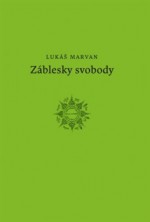Poet, novelist, editor, dramaturge, spokesperson for the fire service. He has lived in Sri Lanka and his poems have been translated into French and Polish. He was born on 4 April 1962.
Lukáš Marvan
Diary of an Avatar
Deník Avatára

The Monk
Mnich

Panther or Leopard
Levhart nebo leopard
| Title | Publisher | Year | Selected published translations | Awards |
|---|---|---|---|---|
| Glimmers of Freedom (Záblesky svobody) | Druhé město | 2014 | ||
| Diary of an Avatar (Deník Avatára) | Druhé město | 2010 | ||
| The Monk (Mnich) | Eminent | 2004 | ||
| Monastery in the Jungle (Klášter v džungli) | Concordia | 2004 | ||
| A Nocturnal Trip through a Diurnal Landscape (Noční cesta denní krajinou) | Petrov | 2003 | ||
| It is Written in the Lines of the World (Je to napsáno v čarách světa) | Petrov | 2000 | ||
| Shades and Stories (Stíny a příběhy) | Torst | 1998 | ||
| Panther or Leopard (Levhart nebo leopard) | Český spisovatel | 1993 |
Diary of an Avatar
Deník Avatára

The Monk
Mnich

Monastery in the Jungle
Klášter v džungli

A Nocturnal Trip through a Diurnal Landscape
Noční cesta denní krajinou

It is Written in the Lines of the World
Je to napsáno v čarách světa

Shades and Stories
Stíny a příběhy

Panther or Leopard
Levhart nebo leopard
Praise
In Diary of an Avatar well-versed readers will find the same motifs of stories which they are familiar with from Marvan’s previous collections. Hints of nightmares which lure the dreamer right into the jaws of death, in order for him then to wake and realize that this little nocturnal death means experiencing deliverance, a shift towards a return and towards the essence of life.
—Dora Kaprálová
MF Dnes
He graduated from the Prague College of Agriculture and then worked as a lab technician and programmer. He worked for twelve years as a journalist at several newspapers and magazines, and then as a dramaturge for Czech Television. He has also written for literary reviews such as Revolver revue, Literární noviny, Host and Souvislosti. His first book was called Levhart nebo leopard (Panther or Leopard, Československý spisovatel, 1993), and five years later saw the publication of his collection Stíny a příběhy (Shades and Stories, Torst, 1998). “The poet’s initial ‘escape’ metamorphoses into a pensive and attentive walk, or just the individual steps along a path which veers almost solely towards the author’s inner landscape,” wrote critic Radim Kopáč. This was followed by the collection Je to napsáno v čarách světa (It is Written in the Lines of the World, Petrov, 2000). In a positive review of the collection academic Vladimír Novotný wrote that, “It seems Lukáš Marvan is gradually becoming the leading poet in the tribe of Kahuda, Topol and Viewegh: this is also written in the lines of the world.”
Noční cesta denní krajinou (A Nocturnal Trip Through a Diurnal Landscape, Petrov, 2003) also garnered positive reviews. Dora Kaprálová in the newspaper MFDnes: “To openly work with dreaming and dreams can be tricky in poetry and does not always pay off. It can easily happen that the dream image slips under the weight of the lyricism of ‘the silvery wind’ and can become the type of sentimental verse you’d find in a young girl’s diary. However, Marvan usually manages to avoid this thanks to his appreciation of meaning and melancholic farce. And neither is his verse reminiscent of the cries and whispers of a sleepwalker. They are more the tranquil speech of an anxious commentator of slightly ‘loopy’ images, whose non-connecting connectedness creates the ruggedly playful surface of the poem: In the morning I pulled out one of your hairs from my mouth/ even though you haven’t lived here for a long time / people in the underground / hedge clippings in mist/ water in the throat/ the moon is the star of insomnia/ I get ready to go out on my bike/ far into the darkness/ ‘Don’t you want to stay over?’/ ask people/ ‘No, I don’t,’ I tell them.”
His six-month stay in Sri Lanka was reflected in the book Mnich – Deník ctihodného Mantakusaly (The Monk – The Diary of the Honourable Mantakusla, Eminent, 2004). The same year also saw the publication of his poetic reflections Klášter v džungli (Monastery in the Jungle, Concordia, 2004).
This was followed by Deník Avatára (Diary of an Avatar, Druhé město, 2010). The author said of it: “Seven or eight years ago I lived as a Buddhist monk in the forests of Ceylon. I gave my mind a real workout there. There were days when, staring into the jaws of madness, I recognised that even if there was no way back, I didn’t have to go crazy. Then I returned to the Czech Republic and gradually realized that the most difficult part of my work was still ahead of me.”
Marvan’s latest book is Záblesky svobody (Glimmers of Freedom, Druhé město, 2014). The annotation states, “In this autobiographical book, the highly regarded poet and writer reflects on the ten years of his life ‘after his return’. He describes his journey to an inner freedom and offers a lively testament of the pitfalls, trials and upheavals that he experienced. He tells of discovering wisdom as well as exposing his own shadow, his own limitations, weakness and pain. He writes about peace, kindness to one another, about the discovery of the ‘inner teacher’ and being reconciled with his father. He talks about transformation, a journey ‘from oneself to another, from receiving to giving.”

